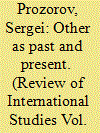| Srl | Item |
| 1 |
ID:
144784


|
|
|
|
|
| Summary/Abstract |
Various reflections on the ‘Arab Spring’ evince a common view of the relationship between change and time that imbues events with a sense of intrinsic peril. Based on a framework developed from Norbert Elias’s concept of timing, this article elaborates the relationship between time and the ‘Arab Spring’ by unpacking and explaining three rhetorical tropes prevalent in academic responses to the revolts. The first two construct a problem to which the third proffers a solution. First, analysts treat time itself as a problematic force confounding stability and progress. Second, they deploy fluvial metaphors to present dynamic events as inherently insecure. Third, they use temporal Othering to retrofit the ‘Arab Spring’ to the familiar arc of liberal democracy, which renders the revolts intelligible and amenable to external intervention. These moves prioritize certainty and order over other considerations and constrain open-ended transformations within a familiar rubric of political progress. They also constitute an active timing effort based on a conservative standard, with important implications for our understanding of security and for scholarly reflexivity. The article concludes with three temporal alternatives for engaging novel changes like the ‘Arab Spring’.
|
|
|
|
|
|
|
|
|
|
|
|
|
|
|
|
| 2 |
ID:
105649


|
|
|
|
|
| Publication |
2011.
|
| Summary/Abstract |
The article ventures a critique of the logic of 'temporal othering' in contemporary International Relations (IR) theory. Originally articulated in the field of European integration, this logic presupposes a possibility for a political community to constitute its identity without any spatial delimitation by means of casting as Other its own past, whose repetition in the future it seeks to avoid. While the image of contemporary Europe as 'othering' its own past has been subjected to empirical criticism, this article makes a conceptual argument for the indissociability of temporal and spatial aspects in any act of othering. Drawing on Alexandre Kojève's reading of Hegel, I argue that any historical action is necessarily spatiotemporal, combining the abstraction of temporal negation with the concrete actuality of a negated spatial being. Alternatives to the logic of sovereign territoriality are therefore not to be sought in the temporal aspect of othering, but rather by pursuing the possibility of self-constitution in the absence of any negating action whatsoever. The article concludes with an outline of such an alternative ethos, developed on the basis of Giorgio Agamben's reconstruction of the Hegelian-Kojèvian problematic of the end of history and his theory of the subject.
|
|
|
|
|
|
|
|
|
|
|
|
|
|
|
|